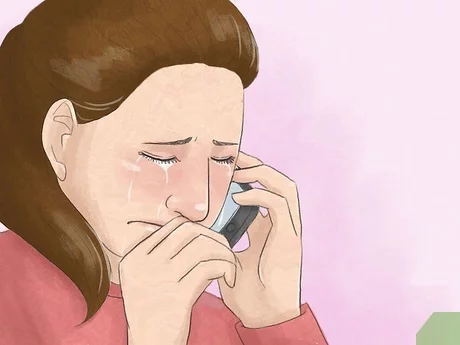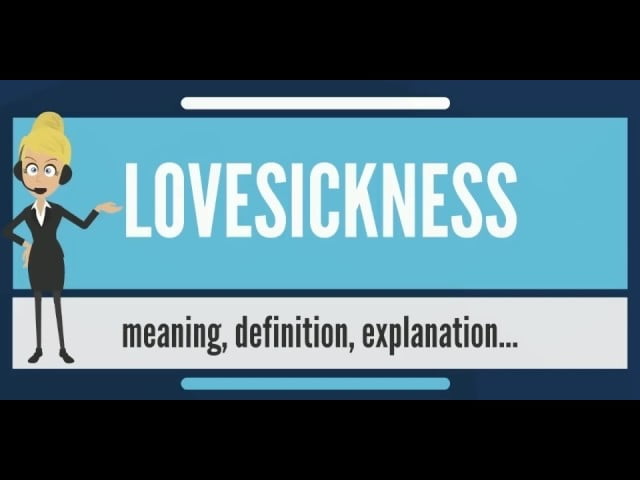Many people have experienced lovesickness at some point in their lives. It’s a feeling of constant, unrequited love for someone you can never be with. There are many signs that show when someone is suffering from this condition. Here are a few of them:
1) You don’t want to do anything else but focus on the person you’re in love with.
2) Daydreaming about him or her makes up most of your time.
3) You feel weak and dizzy when they walk into the room.
4) Your thoughts constantly drift back to memories of your past relationship with them.
5) Anytime you’re not thinking about them, it feels like an eternity has passed by.
Contents
What is Lovesickness?

Lovesickness is a very real condition that many people face today. It is important to know if you are lovesick so you can start taking steps to get better. If you think someone might be suffering from this ailment, try talking to them or encouraging them to go see a professional for help. Lovesickness will only continue if left untreated!
Origination
Lovesickness can stem from many different sources, including unrequited love and loss. Unrequited love is when you know someone likes or loves you but they don’t like or love you back. Loss happens when you lose someone who was important to you. Lovesickness can make people act out in bad ways. Friends and family of people who have lovesickness should be supportive.
Symptoms
Symptoms of lovesickness are different for everyone. Some people become very quiet, while others may act out in frustration or anger when they’re feeling this way. It’s important to identify the symptoms of a problem early on. If you find it too hard to solve, then do something about it before it gets worse.
If you’re in love, you’ll undoubtedly notice some of the following symptoms:

- insomnia
- loss of appetite
- restlessness
- flushed or feverish skin
- a racing pulse, pounding heart, or unusually rapid breathing when thinking about the person
- dizziness, shakiness, or weak knees when encountering them
- pain or tension in your head or chest
- nausea or stomach distress
- increased tearfulness, or the sense you’re constantly on the verge of tears
You might also detect changes in your mood as a result of thoughts about the individual you care about. Your emotions may differ from a general feeling of longing to irritation, anger, anxiety, and forlornness.
Causes of Lovesickness
Lovesickness can have a profound impact on your well-being and daily life. Causes of this condition include:
- unrequited love or loss
- the influence of other people’s opinions, particularly those who want you to stop thinking about the person
- low self-esteem that leads you to believe you don’t deserve happiness with someone else
- social stigmas surrounding the idea of romantic relationships between friends not being able to move forward from past experiences in order to pursue new opportunities
- growing up around negative relationship models such as parents fighting constantly or divorcing each other when children are involved
- lack of communication skills make it difficult for some people to open themselves up emotionally
Potential Benefits of Lovesickness
Lovesickness can have some positive effects as well. This is a good activity to do with friends and family. You may spend time with family members or friends who you haven’t spoken to in a while. Someone who is friends with you might notice that you are not feeling well. That is why it is important to pay attention to the signs of lovesickness.
You don’t want to do anything else but focus on the person you’re in love with you feel weak and dizzy when they walk into the room your thoughts constantly drift back to them
If you’re experiencing any of these symptoms, it could be a sign that lovesickness is taking over your life. There is no time to waste when you have this condition. You need to get the help of professionals who can fix this and stop it from coming back. You don’t want to do anything else but focus on the person you’re in love with; all other things seem irrelevant when compared to their presence in your life. Thoughts about them make you feel bad. They could make you feel weak or dizzy. If you recognize yourself within this description, it may mean that lovesickness has taken hold of your mental health and well-being – so reaching out for professional assistance becomes an absolute priority before things get too serious.
Lovesickness can have a profound impact on your well-being and daily life you might notice changes in mood as a result of thoughts about the individual you care about
How Do We Compare Lovesickness With Other Feelings?
Lovesick vs. Lovestruck

Lovesickness can be described as a deep, often negative feeling of love for someone that is unrequited or unobtainable. You might also use the term “lovesick” to describe feelings of longing and desire when you are not actually in love with them at all. On the other hand, lovestruck refers to an infatuation rather than true feelings of romance; this type of person may act erratically but never truly feels like they’re suffering from lovesickness.
Lovesickness vs. Grief
Romantic loss can feel similar to losing a friend because it involves saying goodbye to what could have been without ever having had it at all – which means sadness about something that will never happen. The best way to distinguish between lovesickness and grief is by looking at the purpose of your feelings; if you’re grieving, then it means that someone close to you has passed away or moved far away from where they once lived. On the other hand, when you are in love with someone but they don’t feel the same about you (or vice versa), this allows for a chance for new relationships down the road even though your current one didn’t work out – so lovesickness would be described as something more like heartbreak than true loss.
Social stigmas surrounding romantic relationships can lead people who experience them to keep their distance feelings of sadness over unrequited love may be experienced due to lack of social support.
Lovesick vs. ‘Honeymoon’
Newly-initiated relationships can sometimes feel like lovesickness, but most people experience it after a few months of dating instead. The “honeymoon” phase is when both individuals are trying to impress each other by acting their best selves; however, this stage doesn’t last forever because you eventually get used to the person’s habits and quirks that annoyed you at first. As time passes, romantic partners often find themselves wanting more out of the relationship or even tempted by others while still in love with someone else – which means uncertainty about where things will go next rather than feelings of despair over an unrequited connection.
What Are Some Ways To Treat Lovesickness?
Lovesickness is a natural reaction that occurs when you fall in love with someone who does not reciprocate your feelings. Unfortunately, there’s no known cure for this condition and it can’t be completely eliminated from one’s life – but you always have the option of engaging in healthy coping mechanisms such as talking to close friends or family members about what’s going on inside your head. Visiting local mental health professionals may also help because they’re trained specifically to provide assistance to people dealing with lovesickness-related symptoms; these might include depression or anxiety due to rejection by another individual. Other than reaching out for outside assistance though, one of the most effective ways to treat lovesickness is to wait until it becomes less intense or manageable before acting on any romantic impulses.
- Embrace your creativity: Turn your emotions into something real by tapping into your creative side. Art, journaling, poetry, or short-story writing are all fantastic methods to experience and express upsetting sentiments.
- Listen to music: Music is a great way to boost your spirits and brighten your day. If you’d rather listen to your favorite heartbreak playlist, go for it. According to research, sad music may also have a beneficial impact on your mood.
- Set boundaries for yourself and stick to them: Making time to recover entails setting aside some space. To put it another way, you should avoid texting, calling, or checking up on them in person or on social media. It’s also a good idea to put off forming friendships until you’re feeling better.
- Take care of your needs: You may not be in the mood to eat, but make an effort to plan nutritious meals and snacks so you can stay healthy. Every night at the same time can help you obtain enough sleep. Meditation and sunshine are two low-cost, easy ways to boost your spirits.
- Try positive distractions: Exercise, hobbies, and time with friends can help you feel better when you’re not feeling well. It’s also a good idea to read books and watch movies to distract yourself.
What If It Still Persists?
You can try to look for ways out. If you are really suffocating, manage your time and walk away from the person who is bringing this pain upon you.
If you are really being consumed, love yourself more. You have to be the one who deserves what it is that you want.
Don’t bother having a long conversation with them unless they can explain things properly and give reasons why things had ended up like this for both of you.
You might feel like dying but don’t—you still need to live your life even if your heart feels badly wounded right now because there will come a day when everything will make sense again. There is no way around this situation; just know that time heals all wounds so stop trying to fix something which already has an expiration date on its head!
There are many possible reasons why lovesickness occurs but it’s usually because of one thing. You need closure on your relationship or break-up situation with someone else. If you still feel this way, it might be a sign that there is something missing in your life. It can be anything, but it might just be love. All that matters is taking care of yourself first before anything else happens again.
Conclusion
Lovesickness is a real thing that affects many people around the world. It can be very difficult to cope with, but it’s important not to let yourself become consumed by your emotions and stay focused on taking care of yourself. If you find yourself feeling lovesick often, there are resources available for help. Whether it’s getting out more or talking about how you feel with someone who cares, make sure to take advantage of them so that this condition doesn’t worsen!
If you are looking for affordable Online Counseling MantraCare can help: Book a trial therapy session


